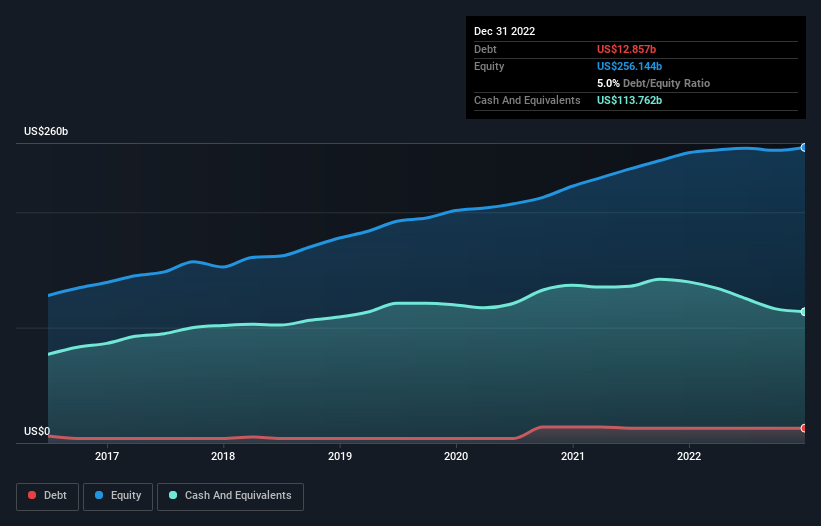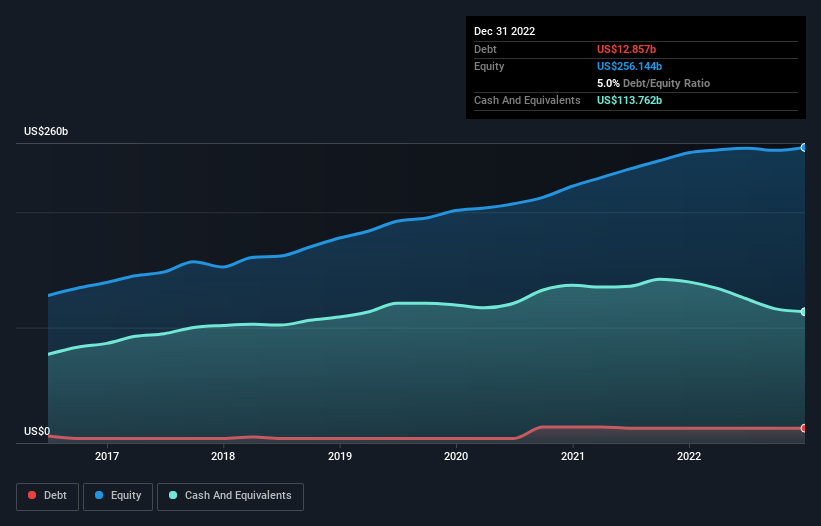Howard Marks put it nicely when he said that, rather than worrying about share price volatility, ‘The possibility of permanent loss is the risk I worry about… and every practical investor I know worries about.’ So it might be obvious that you need to consider debt, when you think about how risky any given stock is, because too much debt can sink a company. As with many other companies Alphabet Inc. (NASDAQ:GOOGL) makes use of debt. But should shareholders be worried about its use of debt?
What Risk Does Debt Bring?
Debt assists a business until the business has trouble paying it off, either with new capital or with free cash flow. Ultimately, if the company can’t fulfill its legal obligations to repay debt, shareholders could walk away with nothing. However, a more usual (but still expensive) situation is where a company must dilute shareholders at a cheap share price simply to get debt under control. Of course, plenty of companies use debt to fund growth, without any negative consequences. When we examine debt levels, we first consider both cash and debt levels, together.
View our latest analysis for Alphabet
What Is Alphabet’s Net Debt?
As you can see below, Alphabet had US$12.9b of debt, at December 2022, which is about the same as the year before. You can click the chart for greater detail. However, its balance sheet shows it holds US$113.8b in cash, so it actually has US$100.9b net cash.
How Strong Is Alphabet’s Balance Sheet?
The latest balance sheet data shows that Alphabet had liabilities of US$69.3b due within a year, and liabilities of US$39.8b falling due after that. On the other hand, it had cash of US$113.8b and US$40.3b worth of receivables due within a year. So it can boast US$44.9b more liquid assets than total liabilities.
This short term liquidity is a sign that Alphabet could probably pay off its debt with ease, as its balance sheet is far from stretched. Succinctly put, Alphabet boasts net cash, so it’s fair to say it does not have a heavy debt load!
On the other hand, Alphabet saw its EBIT drop by 4.9% in the last twelve months. That sort of decline, if sustained, will obviously make debt harder to handle. When analysing debt levels, the balance sheet is the obvious place to start. But it is future earnings, more than anything, that will determine Alphabet’s ability to maintain a healthy balance sheet going forward. So if you want to see what the professionals think, you might find this free report on analyst profit forecasts to be interesting.
Finally, while the tax-man may adore accounting profits, lenders only accept cold hard cash. Alphabet may have net cash on the balance sheet, but it is still interesting to look at how well the business converts its earnings before interest and tax (EBIT) to free cash flow, because that will influence both its need for, and its capacity to manage debt. During the last three years, Alphabet generated free cash flow amounting to a very robust 87% of its EBIT, more than we’d expect. That puts it in a very strong position to pay down debt.
Summing Up
While it is always sensible to investigate a company’s debt, in this case Alphabet has US$100.9b in net cash and a decent-looking balance sheet. The cherry on top was that in converted 87% of that EBIT to free cash flow, bringing in US$60b. So is Alphabet’s debt a risk? It doesn’t seem so to us. Above most other metrics, we think its important to track how fast earnings per share is growing, if at all. If you’ve also come to that realization, you’re in luck, because today you can view this interactive graph of Alphabet’s earnings per share history for free.
When all is said and done, sometimes its easier to focus on companies that don’t even need debt. Readers can access a list of growth stocks with zero net debt 100% free, right now.
Have feedback on this article? Concerned about the content? Get in touch with us directly. Alternatively, email editorial-team (at) simplywallst.com.
This article by Simply Wall St is general in nature. We provide commentary based on historical data and analyst forecasts only using an unbiased methodology and our articles are not intended to be financial advice. It does not constitute a recommendation to buy or sell any stock, and does not take account of your objectives, or your financial situation. We aim to bring you long-term focused analysis driven by fundamental data. Note that our analysis may not factor in the latest price-sensitive company announcements or qualitative material. Simply Wall St has no position in any stocks mentioned.
Join A Paid User Research Session
You’ll receive a US$30 Amazon Gift card for 1 hour of your time while helping us build better investing tools for the individual investors like yourself. Sign up here










